Andes: Cumbres Calchaquies (NW-Argentina)
The alpine belt in the eastern front ranges of the Andes in NW-Argentina still receives
300-400 mm of precipitation per year. Rainfall is, however, extremely dependent on
lee/luv
effects. Within only one hundred meters' distance the climate can change from very wet to
arid. In the humid (luv) part, the treeline is formed by
Alnus
at about 2800 m. In the dry interior (lee) we find a pre-puna type of dryland vegetation
with 10 m tall cactus found up to 3000 m.
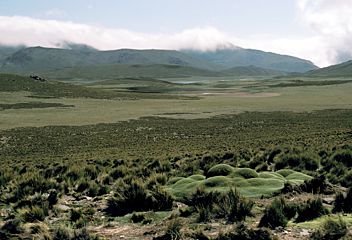
1 -
High Andean grassland at 4250
m dominated by
Festuca orthophylla
(Poaceae)
(Azorella compacta
(Apiaceae) in the foreground).
1 -
High Andean grassland at 4250
m dominated by
Festuca orthophylla
(Poaceae)
(Azorella compacta
(Apiaceae) in the foreground).
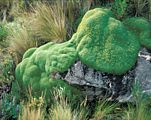
2 -
Azorella compacta
(Apiaceae) (4200 m)
2 -
Azorella compacta
(Apiaceae) (4200 m)
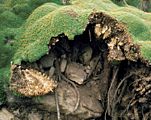
3 -
Azorella:
Very solid cushions, hard as wood.
3 -
Azorella:
Very solid cushions, hard as wood.
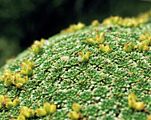
4 -
Azorella:
Aromatic resin droplets at the surface.
4 -
Azorella:
Aromatic resin droplets at the surface.
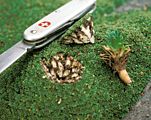
5 -
Azorella:
Extremely compact with slow growth.
5 -
Azorella:
Extremely compact with slow growth.
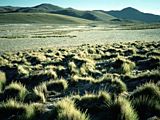
6 -
High Andean grassland at 4250 m dominated by
Festuca orthophylla.
6 -
High Andean grassland at 4250 m dominated by
Festuca orthophylla.
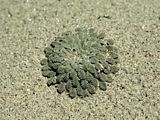
7 -
Mimicking sand helps it hide from
herbivores
(one of the famous Andean
Viola
species.)
7 -
Mimicking sand helps it hide from
herbivores
(one of the famous Andean
Viola
species.)
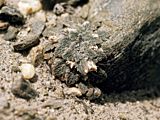
8 -
Mimicking granitic rock helps it hide from herbivores (one of the famous Andean
Viola
species.)
8 -
Mimicking granitic rock helps it hide from herbivores (one of the famous Andean
Viola
species.)
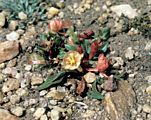
9 -
Small rosettes, closely attached to the ground to survive Guanaco grazing:
Oenothera sp.
(Onagraceae).
9 -
Small rosettes, closely attached to the ground to survive Guanaco grazing:
Oenothera sp.
(Onagraceae).
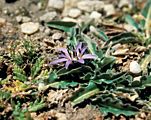
10 -
Perezia sp.
(Asteraceae)
10 -
Perezia sp.
(Asteraceae)
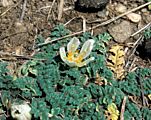
11 -
Caiophora nivalis
(Loasaceae) (4250 m)
11 -
Caiophora nivalis
(Loasaceae) (4250 m)
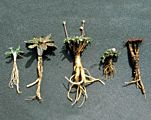
12 -
Massive roots resist frost heaving in winter:
Perezia,
Hypochoeris,
Silene,
Nototriche
(Malvaceae),
Calandrinia
(Portulacaceae).
12 -
Massive roots resist frost heaving in winter:
Perezia,
Hypochoeris,
Silene,
Nototriche
(Malvaceae),
Calandrinia
(Portulacaceae).
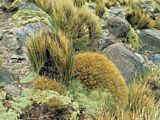
13 -
Tussock grass, cactus cushions (
Tephrocactus af. boliviensis,
Cactaceae), and herbaceous species form diverse mosaics at 4150 m.
13 -
Tussock grass, cactus cushions (
Tephrocactus af. boliviensis,
Cactaceae), and herbaceous species form diverse mosaics at 4150 m.

14 -
Gentianella af. pulla
(Gentianaceae) (4150 m)
14 -
Gentianella af. pulla
(Gentianaceae) (4150 m)

15 -
Calceolaria sp.
(Scrophulariaceae) (4200 m)
15 -
Calceolaria sp.
(Scrophulariaceae) (4200 m)
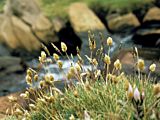
16 -
Calamagrostis (=Deyeuxia) hackelii
(Poaceae) (4150 m)
16 -
Calamagrostis (=Deyeuxia) hackelii
(Poaceae) (4150 m)
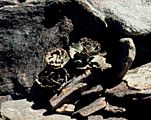
17 -
Menonvillea virens
(Brassicaceae) (Mt. Isabell, 4650 m)
17 -
Menonvillea virens
(Brassicaceae) (Mt. Isabell, 4650 m)
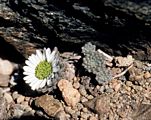
18 -
Chaetanthera lycopodioides
(Asteraceae) (Mt. Isabell, 4550 m)
18 -
Chaetanthera lycopodioides
(Asteraceae) (Mt. Isabell, 4550 m)
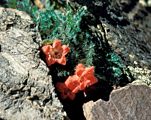
19 -
Caiophora coronata
(Loasaceae) (Real matadero, 4500 m)
19 -
Caiophora coronata
(Loasaceae) (Real matadero, 4500 m)
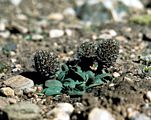
20 -
A black flowering
Valeriana sp.
(Valerianaceae) (Mt. Isabell, 4600 m).
20 -
A black flowering
Valeriana sp.
(Valerianaceae) (Mt. Isabell, 4600 m).





















